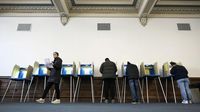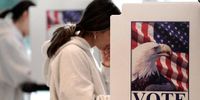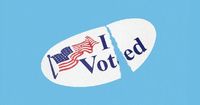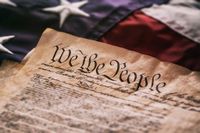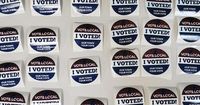On April 10, 2025, the U.S. House of Representatives passed the Safeguard American Voter Eligibility Act, commonly known as the SAVE Act, which mandates proof of U.S. citizenship for individuals registering to vote in federal elections. This legislation, a key priority for former President Donald Trump, faced unanimous opposition from nearly all Democrats, who warned that it could disenfranchise millions of Americans lacking easy access to the necessary documentation.
The SAVE Act, which had previously passed the House in 2024 but failed to clear the Senate, requires applicants using the federal voter registration form to present documentary proof of citizenship in person at their local election offices. Acceptable documents include a valid U.S. passport, a government-issued photo ID, or a certified birth certificate. This requirement is framed by Republicans as a necessary step to ensure that only U.S. citizens participate in elections, thereby restoring public confidence in the electoral process.
U.S. Representative Bryan Steil, a Wisconsin Republican and chair of the House committee overseeing election legislation, stated during the debate, "This bill is meant to restore Americans’ confidence in our elections" and prevent noncitizens from voting. However, critics argue that noncitizen voting is exceedingly rare, already illegal, and carries severe penalties, including felony charges and deportation.
According to a 2023 report from the Brennan Center for Justice and other groups, approximately 9% of U.S. citizens of voting age—around 21.3 million people—do not possess proof of citizenship readily available. Alarmingly, almost half of all Americans do not hold a U.S. passport. In Kansas, a similar proof-of-citizenship requirement implemented in 2011 resulted in over 31,000 eligible U.S. citizens being blocked from registering to vote before the law was declared unconstitutional in 2018.
Democratic representatives voiced strong concerns about the potential impact of the SAVE Act, particularly on married women. Many women who have changed their names due to marriage or divorce may find it difficult to provide the required documentation to prove their citizenship. For instance, one woman in New Hampshire was unable to register for a recent town election because she lacked the marriage certificate necessary to verify her name change. Representative Deborah Ross, a Democrat from North Carolina, highlighted that this legislation could disenfranchise the 69 million women who have changed their names after marriage or divorce.
In response, Republican Representative Laurel Lee from Florida argued that the bill addresses these concerns by instructing states to establish procedures for women who have changed their names. However, critics like Representative Joe Morelle, a Democrat from New York, questioned why such provisions were not explicitly included in the bill, suggesting that the legislation could lead to a confusing patchwork of state standards.
Beyond affecting married women, Democrats warned that the SAVE Act could disproportionately impact older individuals, military service members, people of color, and working-class Americans who may not have the time or resources to navigate the bureaucratic requirements. Representative Nikema Williams, a Democrat from Georgia, stated, "The SAVE Act is everything our civil rights leaders fought against."
As the debate unfolded, social media became a platform for warnings about the SAVE Act. Former Secretary of State Hillary Clinton tweeted on April 9, urging women who had changed their names to contact their representatives, emphasizing that the legislation could make it significantly harder for them to vote. Other prominent Democrats, including Nancy Pelosi and Becca Balint, echoed similar sentiments, cautioning that the bill creates unnecessary obstacles for many voters, including service members stationed overseas.
In a broader context, the SAVE Act has faced significant pushback from various voting rights groups and civil rights advocates. Genesis Robinson, the executive director of the Equal Ground Action Fund, characterized the legislation as a modern-day poll tax, arguing that it would require many citizens to pay for new documents to register to vote.
The bill also includes provisions for frequent voter roll purges to ensure that noncitizens are not voting, a process that critics warn could lead to the disenfranchisement of lawfully registered American citizens. Jonathan Diaz, director of voting advocacy at Campaign Legal Center, highlighted that the bill threatens criminal prosecution for election workers who register individuals without the required proof of citizenship, even if those individuals are eligible U.S. citizens. This creates a chilling effect on election officials, who may fear legal repercussions for making mistakes.
Representative Chip Roy, the bill's author, defended the SAVE Act, arguing that it addresses concerns about illegal voting. He claimed that millions of illegal aliens remain in the U.S., implying that the legislation is necessary to safeguard elections. However, audits, such as one conducted by Georgia Secretary of State Brad Raffensperger, found only 20 noncitizens among Georgia's 8.2 million registered voters, a minuscule fraction.
As Congress prepares to vote on the SAVE Act by the end of the week, the implications of this legislation are significant. If passed, it will proceed to the Republican-controlled Senate, where its fate remains uncertain. The ongoing debate reflects broader tensions regarding voting rights and access in the United States, with advocates on both sides passionately arguing for their positions.
In conclusion, the SAVE Act has ignited a fierce debate over voting rights in America. While proponents assert it is a necessary measure to prevent noncitizen voting, critics argue it poses a threat to the democratic process by disenfranchising millions of eligible voters. As the vote approaches, the nation watches closely, aware that the outcome could reshape the landscape of voter registration and access for years to come.
